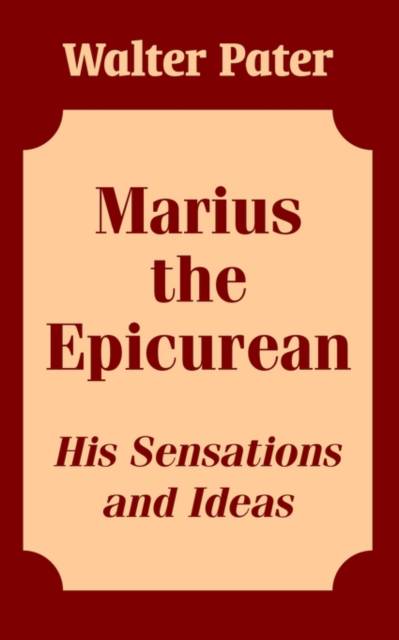
- Retrait gratuit dans votre magasin Club
- 7.000.000 titres dans notre catalogue
- Payer en toute sécurité
- Toujours un magasin près de chez vous
- Retrait gratuit dans votre magasin Club
- 7.000.0000 titres dans notre catalogue
- Payer en toute sécurité
- Toujours un magasin près de chez vous
47,45 €
+ 94 points
Format
Description
An elaborately written philosophical novel of ancient Rome which incorporates a retelling of Apuleius' story of Cupid and Psyche. It was as a critic and a humanist that Walter Pater (1839-1894), professor at Oxford, led the revival of interest in Renaissance art and humanism, becoming a powerful influence on his own and succeeding generations, claiming disciples as diverse as Virginia Woolf and Ezra Pound. This philosophic novel is generally considered his masterpiece. It is the story of a young man's spiritual and aesthetic awakening in ancient Rome. Marius, a grave and thoughtful man, reacts to the diverse philosophical forces of his times by journeying from Stoicism to Cyrenaicism to Epicureanism, and finally to Christianity. The Golden Book of Lucius Apuleius, the stoicism of Marcus Aurelius, the tranquil beauties of the old Roman religion, and the lurid horrors of the Christian persecution are interestingly and imaginatively depicted. "A style of perfectly finished beauty, full of an exquisite restraint, and, after all, only the fitting and adequate expression of the exactest thinking." --Athenaeum "Any one who cares to think on counsels of perfection for man's life will find profound and original thought about the ideal elements still at hand in modern days for use, and many wise reflections, sown among these pages. It is a rare work and not carelessly to be read. Some exquisiteness of taste, some delight in scholarship, some knowledge of what is best worth knowing in the historic expressions of man's aspiration, and, above all, that 'inward tacitness of mind' the reader must bring to its perusal." --Nation "The polish of the style, the depth and refinement of the thought, the picturesque descriptions, and the lofty sentiment of the book as a whole, together with the beautiful gravity and impressiveness that mark it generally, make it a work far out of the ordinary current of fiction." --Boston Saturday Evening Gazette
Spécifications
Parties prenantes
- Auteur(s) :
- Editeur:
Contenu
- Nombre de pages :
- 364
- Langue:
- Anglais
Caractéristiques
- EAN:
- 9781410206640
- Date de parution :
- 10-06-03
- Format:
- Livre broché
- Format numérique:
- Trade paperback (VS)
- Dimensions :
- 127 mm x 203 mm
- Poids :
- 326 g

Les avis
Nous publions uniquement les avis qui respectent les conditions requises. Consultez nos conditions pour les avis.






